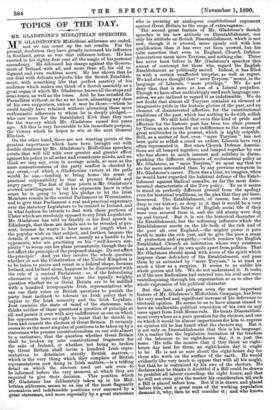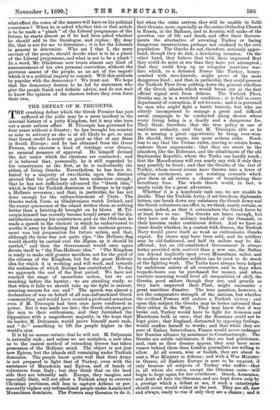TOPICS OF THE DAY.
MR. GLADSTONE'S MIDLOTHIAN SPEECHES.
MR. GLADSTONE'S Midlothian addresses are ended, and we can count up the net results. For the present, doubtless, they have greatly increased his influence in Scotland, great as was that influence before. He has exerted in his eighty-first year all the magic of his personal ascendency. He delivered his charge against the Govern- ment of Ireland with all, and more than all, his old in- dignant and even reckless scorn. He has shown that he can deal with delicate subjects, like the Scotch Establish- ment, with something like that perfect mastery of his audience which makes one think of a Scotch assembly as a great organ of which Mr. Gladstone knows all the stops and semi-tones, as well as the tones. And he has satisfied the Parnellites without, so far as we know, alienating any class of his own supporters, unless it may be those, whom he could hardly have retained without alienating those more enthusiastic adherents to whom he is deeply pledged,— who care more for the Established Kirk than they care for the war-cry which Mr. Gladstone raised five years ago. All this is very favourable to his immediate purpose, the victory which he hopes to win at the next General Election.
On the other hand, there are not wanting points of the greatest importance which have been brought out with double clearness by Mr. Gladstone's Midlothian speeches, points that will tell with ever greater and greater effect against his policy in all sober and considerate minds, and we think we may say, even in average minds, so soon as the mere contentiousness of the party conflict is checked by any event,—of which a Gladstonian victory at the polls would be one,—tending to bring home the sense of practical responsibility to that at present flushed and angry party. The first of these points is Mr. Gladstone's avowed unwillingness to let his opponents know in what sense he is going to keep his pledge to let the Irish Members remain in the central Parliament at Westminster, and to give that Parliament a real and practical supremacy over the statutory Legislature to be created in Ireland, and in what fashion he intends to deal with those portions of Ulster which are resolutely opposed to any Irish Legislature. Mr. Gladstone has told us frankly in his final speech in Edinburgh, that these are details not to be revealed at pre- sent, because he wants to hear more at length what is the popular wish on that subject, and further, because the details, if now given, will serve merely as a handle to his opponents, who are practising on his " well-known sim- plicity " to worm out his plans prematurely, though they do not affect the principle of the proposed change. Do not affect the principle ! And yet they involve the whole question whether or not the Constitution of the United Kingdom is to be taken to pieces and recast in a federal shape, because Ireland, and Ireland alone, happens to be discontented with the rule of a central Parliament ; or, if the federalising alternative is rejected, they raise the equally weighty question whether we in Great Britain are to be saddled with a hundred irresponsible Irish representatives who can use their votes on British questions to punish the party least inclined to tolerate an Irish policy that is unjust to the Irish minority and the Irish Loyalists. Just conceive the state of mind of the statesman who thinks neither of these questions a question of principle at all, and passes it over with airy indifference as one on which his opponents have no right to insist that he should in- form and consult the electors of Great Britain. It certainly seems to us the most singular of positions to be taken up by a statesman who presses constitutionalism on one side almost to a caricature, that the question whether Great Britain shall be ..broken up into constitutional fragments for the sake of Ireland, or whether, not being so broken up, Great Britain ;hall invite a hundred Irish repre- sentatives to determine strictly British matters,— which is the very thing which they complain of British representatives now doing in Irish matters,—is a trifling detail on which the electors need not ask even to be informed before the very moment at which they are required to give their decision. This position which Mr. Gladstone has deliberately taken up in his Mid- lothian addresses, seems to us one of the most flagrantly anomalous indefensible positions ever assumed by a great statesman, and more especially by a great statesman who is pressing an analogous constitutional argument against Great Britain to the verge of extravagance. The second great feature of Mr. Gladstone's Scotch speeches is his new attitude on Disestablishment, not only his attitude on Scotch Disestablishment, which is not new, though it is avowed more openly and with less qualification than it has ever yet been avowed, but his calm assertion that even in England, Church Defence Associations mean mere Toryism, and nothing else. There has never been before in Mr. Gladstone's speeches this. accent of contempt for those who regard the Pugh& Establishment as politically sacred. Indeed, it has filled us with a certain unaffected surprise, as well as regret.. We had always thought that " mere Toryism " meant, in the language of Liberals, " mere privilege." We do not deny that that is more or less of a Liberal prejudice. Though we have often unthinkingly used such language our- selves, we are inclined to regard it as indefensible. We do not doubt that almost all Toryism contains an element of imaginative pride in the historic glories of the past, and an element of disinterested affection for the constitutional traditions of the past, which has nothing to do with selfish privilege. We still hold that even this kind of pride and affection for the historic past has been too often pressed by Tories as an excuse for an indifference to the misery of great multitudes in the present, which is highly culpable; Still, as a matter of fact, even " mere Toryism " has not been quite so selfish a creed as ardent Liberals have very often represented it. But when Church Defence Associa- tions are all lumped together, and lumped together by one who has shown so much interest and subtlety in distin- guishing the different elements of ecclesiastical policy as Mr. Gladstone, as " mere Toryism," we must say that we- are far more astounded than by any previous symptom in Mr. Gladstone's career. There was a time, we imagine, when he would have regarded the habitual defence of the Estab- lishment against Radical assaults, as far the most disin- terested characteristic of the Tory policy. To us it seems• to stand on perfectly different ground from the apology even for historical traditions, on the plea that they are time- honoured. The Establishment, of course, has its roots deep in our history, so deep in it that it would be a very rough shake to the fabric of English social life if they were ever severed from it, and the old stump were dug up and burned. But it is not the historical character of the Establishment, but the softening influence which the Establishment exerts on the life both of the rich and of the poor all over England,—the mighty power it puts. forth to make the rich just, and to give the poor a sense of protection and sympathy,—which renders the English. Established Church an institution whose very existence has a sacredness of its own quite apart from politics. That Mr. Gladstone should speak with scorn of the spirit which inspires these defenders of the Establishment, and pass- them by as animated by " mere Toryism," is at least as much a blow as a surprise. It seems to us unlike his whole genius and life. We do not understand it. It looks as if the new Radicalism had entered into his soul and were ventriloquising through his organisation so as to alter the whole expression of his political character.
But the last, and perhaps even the most important feature of Mr. Gladstone's Midlothian Campaign, has been the very marked and significant increase of his deference to electoral opinion. He seems to us to have almost ceased to have an unalterable political conviction of his own on any issue apart from Irish Home-rule. He treats Disestablish- ment everywhere as a pure question for the electors, and one on which it would be almost impertinent for him to express an opinion till he has heard what the electors say. But it is not only on Disestablishment that this is his language: On a matter like the legislative limitation of the freedom of the labourer to an eight-hours day, it is just the. same. He tells the miners that if they think an eight- hours day best for them, an eight-hours day it ought, to be. He is not so sure about the eight-hours day for those who work on the surface of the earth. He would evidently like very much to oppose that with all his might,, but that he is restrained by his awe of the electors. He declares that he thinks it doubtful if a Bill could be drawn to prohibit all labour exceeding the eight hours, and that he will not even give the matter his consideration till such a Bill is placed before him. But if it is drawn and placed before him, and a great mass of the working population demand it, why, then he will consider it; and who knows what effect the votes of the masses will have on his political conscience ? When he is asked whether this or that article is to be made a " plank " of the Liberal programme of the future, he starts almost as if he had been asked whether he should add to the Decalogue, and replies : My dear Sir, that is not for me to determine ; it is for the Liberals in general to determine. Who am I that I, the mere servant of the people, should decide what is to be a plank of the Liberal programme, and what is not to be a plank ? In a word, Mr. Gladstone now treats almost any kind of announcement of his own personal conviction, without the previous assent of the people, as an act of lose majeste which it is a political impiety to commit. Will this attitude be popular with the democracy ? We trust not. We hope that the democracy desires to be led by statesmen who give the people frank and definite advice, and do not wait to know the opinion of the electors before they even form their own.



















































 Previous page
Previous page